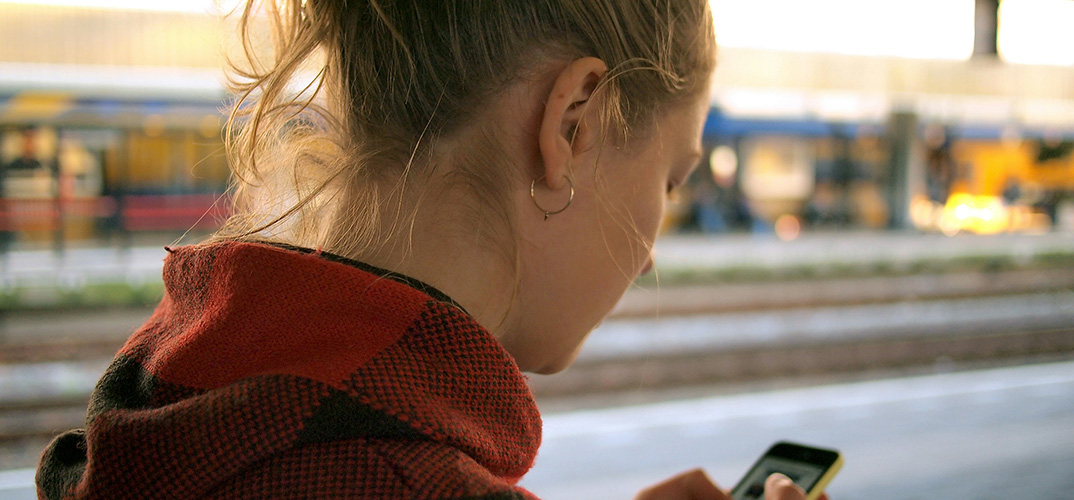Local secondary schools called upon to support study aimed at reducing harmful impact of internet use on teenage mental health

Pupils from secondary schools across Hertfordshire, Bedfordshire, Essex, Buckinghamshire, Middlesex and North London are being invited to take part in a Europe-wide study aimed at reducing the harmful impact of internet use on mental health.
The pioneering research - known as the BootStRaP (Boosting Societal Adaptation and Mental Health in a Rapidly Digitalising, Post-Pandemic Europe) project and being led by the University of Hertfordshire – intends to recruit up to 10,000 young people from across Europe during the five-year project, to explore how they use the internet, understand which behaviors may lead to harm and determine how these can be addressed.
Conducted through a mobile app called BootstrApp, which participants are asked to download onto their phones, it’s been designed to investigate a number of parameters including Internet usage time and phone use patterns, while also sending participants questions about their health, wellbeing, mood, and Internet use.
The data gathered will help to provide a clear picture on how young people from different European countries across different socioeconomic backgrounds and education systems use the internet on a day-to-day basis.
Naomi Fineberg, Professor of Psychiatry at the University of Hertfordshire and the Hertfordshire Partnership University NHS Foundation Trust and Principle Investigator & Scientific Coordinator for BootStRaP, said:
"With over 90% of young people in the UK now owning a smartphone, our teenagers are the online generation. It’s why it’s so important to ensure they understand the risks as well as the benefits, know how to self-regulate internet use and content accessed, and are empowered to use the internet safely.”
Funded by Horizon Europe, Innovate UK and Swiss SARI, the project is the first large-scale, standardised analysis of the impact of internet use on young people with such a broad and diverse range of participants.
In particular, it will examine problematic use of internet (PUI) – loss of control of engagement in online activities such as use of social media, gaming, online shopping or pornography – with results used to produce policy recommendations in health and social care of children and teenagers.
“It is currently estimated that around a quarter of young people are affected by PUI, and we regularly hear anecdotally about the issues being faced by parents and young people due to excessive internet use,” continues Professor Fineberg.
“However, this project isn’t about deterring young people from using the internet. The internet has huge benefits that have transformed our society and many parts of life – and the very existence of online activities such as gambling, shopping or gaming isn’t a bad thing in itself.”
“But there is clear evidence that internet use goes hand-in-hand with some harmful behaviours that are affecting people’s health and wellbeing, particularly younger people. More scientific evidence is needed to determine the boundaries between normal and excessive internet use and behaviour patterns, to help us understand how using the internet affects a young person’s mood and wellbeing and when this can harm health.
With the aim of recruiting 4,000 teenagers from the UK alone, researchers are now inviting more local school communities, parents and teenagers to engage with the next phase.
“We take care to protect our young people’s confidentiality by ensuring their data is kept strictly anonymous. To protect their privacy, we won’t be able to see where they are, the content of what they are viewing or who they are phoning. Instead, the app has been designed to examine more broadly the types of platforms they are accessing, what times of day they are being accessed and the length of time they are being used to help determine when internet use might be becoming obsessive and therefore problematic”.
More than 100 teenagers from four schools in Hertfordshire – Croxley Danes in Rickmansworth, Dame Alice Owens School in Potters Bar, William Perkins in Greenford and JCOSS in New Barnet – and almost 2,000 young people from across Europe are already taking part in the BootStRaP project, with the first phase due to be completed in October this year.
Those using the app will also be offered free resources about healthy ways of using the internet, as well as expert advice on how to mitigate risks and avoid developing problematic internet use in the future.
Andy Harris, headteacher of Croxley Danes School in Rickmansworth – one of the schools supporting the project - said:
“While we don’t have issues with phone and internet use at Croxley Danes due to us having very clear rules and systems in place, it is a significant issue outside of school that is impacting our young people’s mental health and peer relationships.
“We decided to get involved with the BootStRap project because we think it’s a really fantastic opportunity to gather the data needed to better understand and address issues around problematic internet use, that will inform effective strategies for improving our students' well-being, their online safety in and outside of school and ultimately their academic success.”
If you are linked to a secondary school in Hertfordshire, Bedfordshire, Essex, Buckinghamshire, Middlesex or North London and are interested in supporting the BootStRap project, please email bootstrap@herts.ac.uk. Find out more about BootStRap, which was featured on The One Show on Tuesday 4 March at 7pm.